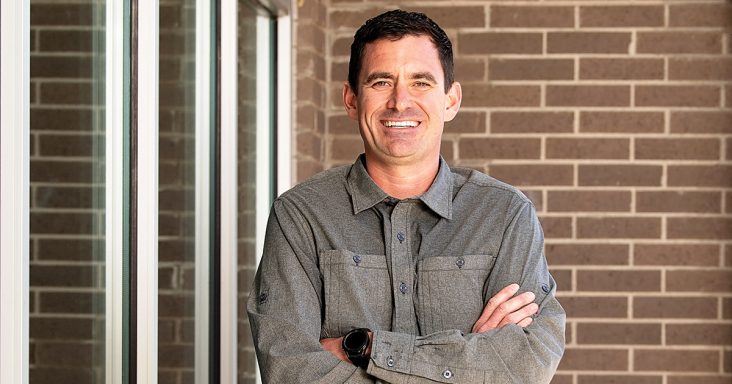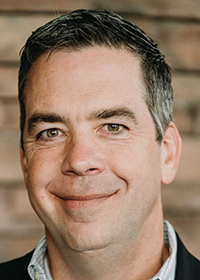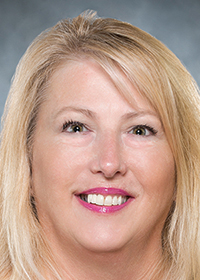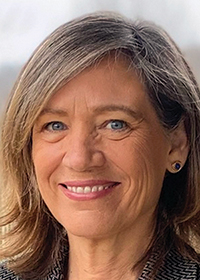NWA lenders take on emergent housing challenge
by April 20, 2022 1:59 pm 2,079 views

Will Gladden, Fayetteville market president for Signature Bank of Arkansas, is working with several area banks to address the housing affordability challenge.
Housing affordability is a growing challenge for Northwest Arkansas, and it’s one that bank executive Will Gladden said is essential to address for the continued growth of the region.
While banks and financial institutions might be limited in addressing it, they are working in different ways to make an impact. Gladden is Fayetteville market president for Signature Bank of Arkansas and among several area banking executives facing the challenge.
“A unique thing we’ve done in the last few years is that we’ve invested in tax credits,” Gladden said. “There was a fund of six low-income housing tax credit projects in Northwest Arkansas awarded in 2020. The fund was put together with those six projects. Signature and four or five other banks are funding the majority of those projects.”
He said the bank became an investor in the affordable housing projects in 2021. According to a project presentation, the Arkansas Development Finance Authority awarded tax credit financing to the projects totaling over $50 million. The projects will be in Bentonville, Fayetteville and Springdale and comprise 425 duplex/triplex and multifamily units for households with income ranging between $29,000 and $68,000, the presentation shows. The average monthly rent ranges between $367 and $532 for units from one to four bedrooms.
“If we don’t have affordable housing, we’re not going to be able to continue attracting larger businesses, especially manufacturing and those types of businesses,” Gladden said. “It impacts everybody.”
Hunter Norton, Fayetteville market president for Encore Bank, and Landon Taylor, bank president and chief operating officer for First Western Bank in Rogers, noted their involvement in the tax credit projects. Taylor said they are in the regional bank’s market and those the bank often supports, comprising one-to-four family developments.
“Encore Bank is honored to invest in the NWA Regional Fund and support these affordable housing developments in our region,” Norton said. “The lack of affordable housing has been clearly identified as one of NWA’s largest challenges as we continue to be blessed with significant population growth.”
OTHER PROJECTS
In another effort to address the housing challenge, the bank recently added a community outreach team.
“Our focus is to be intentional about reaching the underserved and addressing the challenges of our community, such as affordable housing to uplift our communities through homeownership,” said Josh Vasquez, vice president and community outreach officer for Encore Bank. “Each team member has been individually handpicked to serve their respective markets and work closely with each department to help bridge the gap.”

Mark Cloud, vice president of commercial lending for First National Bank of NWA, said the bank is working with Fayetteville nonprofit Partners for Better Housing to help pay for home construction in its 80-home Willow Bend development in south Fayetteville. He said the bank looks to help the nonprofit bring developments to other area cities. Also, Cloud has been working on financing for two tiny home developments in Rogers — a 28-home project on Olive Street and a 50-home development on Monte Ne Road.
He said the high land cost has been a challenge for those looking to build a home, which has led people to look further from cities. He added that they face higher transportation costs, especially amid higher gas prices.
According to the Center for Neighborhood Technology, the average household in Northwest Arkansas spends 52% of its income on housing and transportation combined, or 27% on transportation and 25% on housing. According to Habitat for Humanity, households that spend at least 30% of their income on housing are housing cost-burdened.
Cloud also said he expects to see more multistory condo developments and provide financing for them. He noted that occupants own condos, unlike apartments in which tenants lease them.
BIDDING WARS

Dixie Cosper, community development lender and mortgage loan officer for Cadence Bank (formerly BancorpSouth Bank), said the area has a low inventory of habitable homes in the $200,000 range. When such homes become available, they are often quickly purchased by investors who pay cash and use them as rentals.
She said that first-time buyers have faced bidding wars over the past year. That might include when a home with a $200,000 appraised value receives an offer $25,000 higher than the value. She recommended that first-time buyers avoid bidding wars unless they have a large amount of cash.
“That’s something we’re still working on, trying to figure outside the box how we’re going to solve that with our rates jumping up at the same time,” she said. “I have a program that I specialize in, and I look for homes for them that might be pegged in a census tract for low-to-moderate-income housing and see if I can find a home that might be suitable for them where they don’t have to come with a huge savings account drained and can get in that home. That is my focus right now.”
Cosper said the bank offers a loan program that features a $500 down payment and low closing costs. That’s especially attractive for first-time buyers.
Charlie Van Ness, Fayetteville market president for Simmons Bank, said the low home inventory has been the biggest challenge. Later this year, he said the bank would offer a 30-year fixed mortgage that doesn’t require private mortgage insurance and only a 10% down payment. It also offers down payment assistance programs.
“We work with a number of community partners in the region to provide housing opportunities,” said Van Ness, “including New Beginnings NWA, which provides housing for members of our community experiencing homelessness. I’m an advisory board member of the NWA chapter of CCOA — Credit Counseling of Arkansas. It strives to help those who need financial guidance and skills, methods to repair credit.”
‘WEALTH-BUILDING INITIATIVES’

Bryn Bagwell, director of lending for Fayetteville-based Communities Unlimited, said the Community Development Financial Institution addresses low-income housing in rural areas in the South and highlighted franchise model Mi Casita, allowing homeowners to purchase a modular home for $50,000. She noted a pilot project underway in Texas along the Mexico border, and it might come to Arkansas in 2023.
“The modular home is designed to be affordable and basic initially, but has modular components that will be built offsite and added to grow the home as the family and income grow, one-bedroom/bath or combination at a time,” Bagwell said. “It’s one of our wealth-building initiatives to help people start small with what they can afford and grow without getting them into higher debt.”
Alex Martin, vice president and loan officer for Century Bank of the Ozarks in Fayetteville, said the Community Development Financial Institution commits at least 60% of loan proceeds to income-challenged areas.
“We’re focused on building relationships with investors and developers in income-challenged areas,” Martin said. “It’s a huge problem in the area. It’s growing and getting worse every year. We’re doing everything we can to utilize our tools at hand to address the issue.”

He also noted the bank’s continued involvement in the low-income housing tax credit program and support for Partners for Better Housing.
“Northwest Arkansas is rapidly growing and developing, and affordable housing is a key concern in our region that no one organization, community partner or entity can solve alone,” said Jamey Vaught, Northwest Arkansas market president at First Horizon Bank. “First Horizon recognizes these facts and sees the opportunity to collaborate and join forces to help provide resources through our products and services and philanthropic efforts to find solutions and reduce the barriers to access. We are excited to see that other regional lenders are also stepping up to support this vital work and address this regional challenge.”
